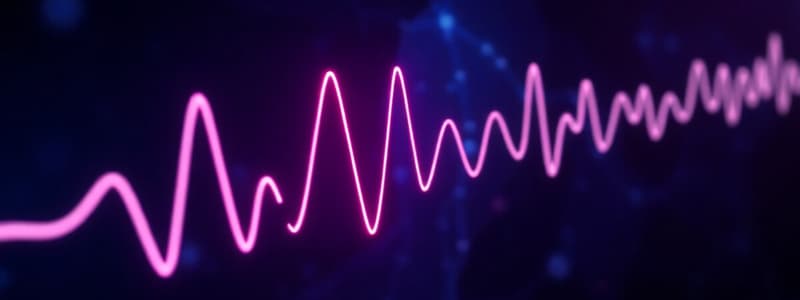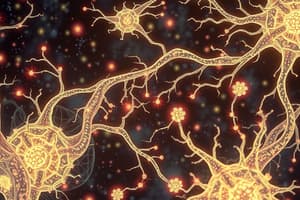Podcast
Questions and Answers
What part of a neuron is primarily responsible for receiving information?
What part of a neuron is primarily responsible for receiving information?
- Soma
- Axon
- Dendrites (correct)
- Myelin sheath
Which ion has a higher concentration outside a neuron compared to its inside at resting potential?
Which ion has a higher concentration outside a neuron compared to its inside at resting potential?
- Potassium
- Sodium (correct)
- Calcium
- Chloride
What is the term used to describe the difference in electrical potential across a membrane?
What is the term used to describe the difference in electrical potential across a membrane?
- Electrical gradient
- Electrochemical gradient (correct)
- Concentration gradient
- Resting potential
What type of ion channel opens in response to changes in membrane potential?
What type of ion channel opens in response to changes in membrane potential?
During the absolute refractory period, what is the status of the neuron?
During the absolute refractory period, what is the status of the neuron?
How does the sodium-potassium exchange pump contribute to neuron function?
How does the sodium-potassium exchange pump contribute to neuron function?
What event occurs first when an action potential is generated?
What event occurs first when an action potential is generated?
What type of conduction does myelinated axons use for impulse propagation?
What type of conduction does myelinated axons use for impulse propagation?
What initiates the cycle of depolarization during an action potential?
What initiates the cycle of depolarization during an action potential?
Which statement accurately describes the all-or-none phenomenon?
Which statement accurately describes the all-or-none phenomenon?
What role do sodium-potassium pumps play after an action potential?
What role do sodium-potassium pumps play after an action potential?
How does the propagation of an action potential occur?
How does the propagation of an action potential occur?
Why can an action potential only propagate in a forward direction?
Why can an action potential only propagate in a forward direction?
What occurs to the membrane's potential when depolarization reaches the threshold?
What occurs to the membrane's potential when depolarization reaches the threshold?
What is the primary difference between the propagation in myelinated and nonmyelinated axons?
What is the primary difference between the propagation in myelinated and nonmyelinated axons?
What must occur for an axon to fire an action potential?
What must occur for an axon to fire an action potential?
What is the primary function of the axon in a neuron?
What is the primary function of the axon in a neuron?
What type of movement does anterograde transportation refer to?
What type of movement does anterograde transportation refer to?
What does Ohm's law describe?
What does Ohm's law describe?
What is the role of leakage channels in the neuronal membrane?
What is the role of leakage channels in the neuronal membrane?
What is the term for the potential energy generated by separated charges?
What is the term for the potential energy generated by separated charges?
Which type of ion channel opens in response to chemical binding?
Which type of ion channel opens in response to chemical binding?
Which statement about membrane potentials in neurons is correct?
Which statement about membrane potentials in neurons is correct?
What does retrograde transportation in a neuron primarily involve?
What does retrograde transportation in a neuron primarily involve?
How does an increase in resistance affect current flow according to Ohm's law?
How does an increase in resistance affect current flow according to Ohm's law?
What is the function of the Schmidt cell in neuronal anatomy?
What is the function of the Schmidt cell in neuronal anatomy?
What occurs during hyperpolarization of the membrane?
What occurs during hyperpolarization of the membrane?
Which of the following correctly describes graded potentials?
Which of the following correctly describes graded potentials?
How do graded potentials differ from action potentials?
How do graded potentials differ from action potentials?
Which type of graded potential occurs in sensory neurons?
Which type of graded potential occurs in sensory neurons?
What is true about the flow of current in graded potentials?
What is true about the flow of current in graded potentials?
Which statement about action potentials is correct?
Which statement about action potentials is correct?
What initiates the depolarization in graded potentials?
What initiates the depolarization in graded potentials?
What effect does increased stimulus strength have on graded potentials?
What effect does increased stimulus strength have on graded potentials?
What determines the difference between a weak stimulus and a strong one in the nervous system?
What determines the difference between a weak stimulus and a strong one in the nervous system?
Which type of refractory period allows for the possibility of a second action potential under certain conditions?
Which type of refractory period allows for the possibility of a second action potential under certain conditions?
What is the primary factor influencing the conduction velocity of action potentials in axons?
What is the primary factor influencing the conduction velocity of action potentials in axons?
Which statement is true regarding the absolute refractory period?
Which statement is true regarding the absolute refractory period?
How are larger-diameter axons advantageous for action potential conduction?
How are larger-diameter axons advantageous for action potential conduction?
Flashcards are hidden until you start studying
Study Notes
Action Potential
- Neurons are highly excitable and can rapidly change resting membrane potential
- Action potentials (APs) are the primary mechanism for long-distance neural communication.
- APs only occur in muscle cells and axons of neurons
- APs are brief reversals of membrane potential with a voltage change of approximately 100 mV.
- APs do not decay over distance like graded potentials do
- APs involve the opening of specific voltage-gated channels
Resting Membrane Potential
- All cells have a resting membrane potential.
- Neurons can quickly change their resting membrane potential.
Threshold and the All-or-None Phenomenon
- Not all depolarization events produce APs
- For an axon to "fire," depolarization must reach a threshold voltage, which triggers the AP.
- Threshold is characterized by:
- Membrane depolarization by 15 to 20 mV.
- Increased Na+ permeability.
- Na+ influx surpasses K+ efflux.
- Initiation of the positive feedback loop.
- All-or-None Principle: an AP either occurs completely or not at all.
Propagation of an Action Potential
- Propagation facilitates the transmission of APs from their origin down the entire axon length towards terminals.
- Na+ influx through voltage gates in one membrane area leads to local currents, which open Na+ voltage gates in nearby membrane areas
- This causes depolarization in that area, which in turn causes depolarization in the adjacent area.
- Once initiated, an AP is self-propagating.
- In non-myelinated axons, each segment of membrane depolarizes then repolarizes
- Propagation in myelinated axons differs
- Since Na+ channels closer to the AP origin are still inactivated, no new AP is generated there.
- The AP occurs only in a forward direction.
Coding for Stimulus Intensity
- All APs are alike and are independent of stimulus intensity.
- The CNS distinguishes between weak and strong stimuli by the frequency of impulses, which is the number of impulses (APs) received per second.
- Higher frequencies indicate stronger stimuli.
Refractory Periods
- Refractory period is the period during which a neuron cannot trigger another AP. - Voltage-gated Na+ channels are open, preventing the neuron from responding to another stimulus, regardless of strength or frequency.
- Absolute Refractory Period: another AP is not possible until the reset of the VG Na+ channels.
- Enforces the All-or-None Principle
- Relative Refractory Period: follows the absolute refractory period, most Na+ channels are already reset.
- Coincides with repolarization.
Conduction Velocity
- APs only occur in axons, not other cell areas.
- AP conduction velocities in axons vary widely.
- Rate of AP propagation depends on:
- Axon Diameter: larger-diameter fibers have less resistance to local current flow, which leads to faster impulse conduction.
- Myelination: myelinated axons exhibit saltatory conduction, increasing conduction velocity.
Studying That Suits You
Use AI to generate personalized quizzes and flashcards to suit your learning preferences.




